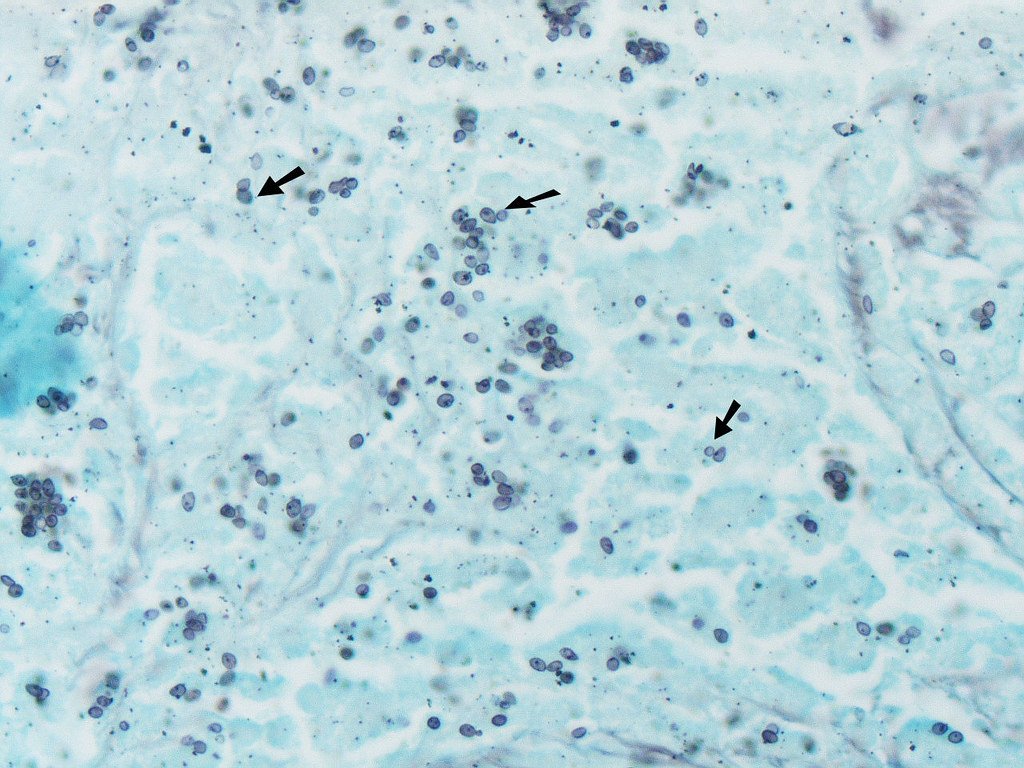Histoplasmosis

What Is Histoplasmosis?
Histoplasmosis is a viral infection caused by the Histoplasma fungus. The fungus can be found in the environment, especially in soil with a lot of bird or bat droppings. Histoplasma is found primarily in the central and eastern states of the United States, particularly in the Ohio and Mississippi River valleys. Parts of Central and South America, Africa, Australia, and Asia are also home to the fungus. 1Go To Source cdc.gov -“Histoplasmosis”
Learn More: Wildlife Diseases
Which Species Are Affected By Histoplasmosis?
Any mammal is able to contract histoplasmosis. Typically the disease is found in these wild animals:
How Is Histoplasmosis Spread To People and Animals?
The organism that contains histoplasmosis can be found worldwide, growing in soil enriched with bird or bat feces or in bat droppings themselves, such as around old chicken houses, caves, and other bat-infested areas, and starling and blackbird roosts. If the soil is disturbed, the fungus produces spores that can become airborne. Inhaling these spores can result in infection. The disease is not spread from person to person, nor is it spread by infected animals. Both people and animals can inhale histoplasmosis spores. 2Go To Source idph.state.il.us -“HISTOPLASMOSIS”
Are Humans Or Pets Affected By Histoplasmosis?

People can contract histoplasmosis by inhaling microscopic fungal spores in the air. Although most people who inhale the spores do not become ill, those who do may experience a fever, cough, and fatigue. Many people with histoplasmosis will get better on their own without medication, but the infection can be severe in some people, such as those with weakened immune systems.
Pets can contract histoplasmosis, particularly cats, but it is not contagious between animals and humans. Cat and dog histoplasmosis is similar to human histoplasmosis. Many cats and dogs who are exposed to Histoplasma do not become ill. Coughing, lack of energy, and weight loss are common symptoms in cats and dogs who develop symptoms. The fungus that causes histoplasmosis thrives in soil contaminated with bird droppings, but birds do not appear to be susceptible to the disease. Please consult a veterinarian if you are concerned about your pet’s risk of contracting histoplasmosis or suspect that your pet has the disease.
What Are The Visual Signs Of Histoplasmosis?
Histoplasmosis infection is often so mild that no symptoms are noticeable. Symptoms are often similar to those of a common cold. In fact, if you had symptoms of histoplasmosis, you might think you had a cold or the flu. This is because, without treatment, the body’s immune system usually defeats the infection within a few days.
In the early stages of POHS (Presumed ocular histoplasmosis syndrome), there are often no symptoms. It’s possible to have POHS without realizing it. After the inflammation has subsided, tiny scars known as histo-spots remain at the infection sites. These histo-spots may be the only way to determine whether or not you have an infection. Histo-spots don’t usually impair vision. They can cause complications years or even decades later, although ophthalmologists have no idea why. Researchers have discovered that histo-spots are linked to the development of abnormal blood vessels beneath the retina.
If these abnormal blood vessels spread to retina areas critical for good vision, histoplasmosis symptoms may appear. POHS symptoms are similar to those of macular degeneration.
How Harmful Is Histoplasmosis?
Histoplasmosis usually causes mild flu-like symptoms that appear three to seventeen days after exposure to the fungus. Fever, chills, headache, muscle aches, cough, and chest discomfort are some of the symptoms. Most symptoms in these milder forms go away on their own after a few weeks.
Symptoms may progress and become more severe if the exposure is severe or the patient is more vulnerable. Coughing causes thick, yellow sputum or blood to be coughed up. Shortness of breath will occur, and they may eventually show signs of respiratory failure.
Patients may experience complications if histoplasmosis spreads throughout the body. These symptoms include a swollen spleen and liver, gastrointestinal bleeding, ulcers on the lips and mouth, and a decrease in white and red blood cells, all of which lead to bone marrow failure.
How To Prevent Contracting Histoplasmosis?

Exposure to the fungus that causes histoplasmosis is difficult to avoid, especially in areas where the disease is widespread. However, taking the following precautions may help to lower the risk of infection:
- You can also reduce your risk by spraying chicken coops and barns before cleaning them.
- Use a respirator mask to protect your lungs when exploring tunnels.
- Avoid projects and activities like cave exploration and raising birds like pigeons or chickens that could expose you to the fungus. Using a spray bottle, spray contaminated surfaces. Soak soil or work in an area that could harbor the fungus that causes histoplasmosis with water before digging. This can help prevent the spread of spores into the air.
What To Do If You Have Histoplasmosis?
Mild cases of histoplasmosis may go away on their own. Antifungal medications are used to treat severe cases of acute histoplasmosis, as well as all cases of chronic and disseminated disease, sometimes for the rest of one’s life in those with compromised immune systems. If you have been exposed to histoplasmosis or believe that you are showing symptoms of the virus, contact a physician right away.
Bat dropping in your attic from a bat infestation may be spreading histoplasmosis to you and your pests. The safest option is to hire wildlife removal specialists to remove any bats from the attic. They will also decontaminate your home and clean up any feces left behind. Removing the feces on your own is risky because the disease is spread through the air, and breathing in feces bacteria will put you at risk.
Sources:
- CDC. “Histoplasmosis | Types of Diseases | Fungal Diseases | CDC.” Center For Disease Control And Prevention, U.S. Department of Health & Human Services, 29 Dec. 2020, www.cdc.gov/fungal/diseases/histoplasmosis/index.html#:%7E:text=Histoplasmosis%20is%20an%20infection%20caused,of%20bird%20or%20bat%20droppings.
- Illinois Department of Public Health. “HISTOPLASMOSIS.” Illinois Department Of Public Health, 25 Apr. 2007, www.idph.state.il.us/public/hb/hbhisto.htm#:%7E:text=Dogs%2C%20cats%2C%20rats%2C%20skunks,through%20breathing%20in%20airborne%20spores.
